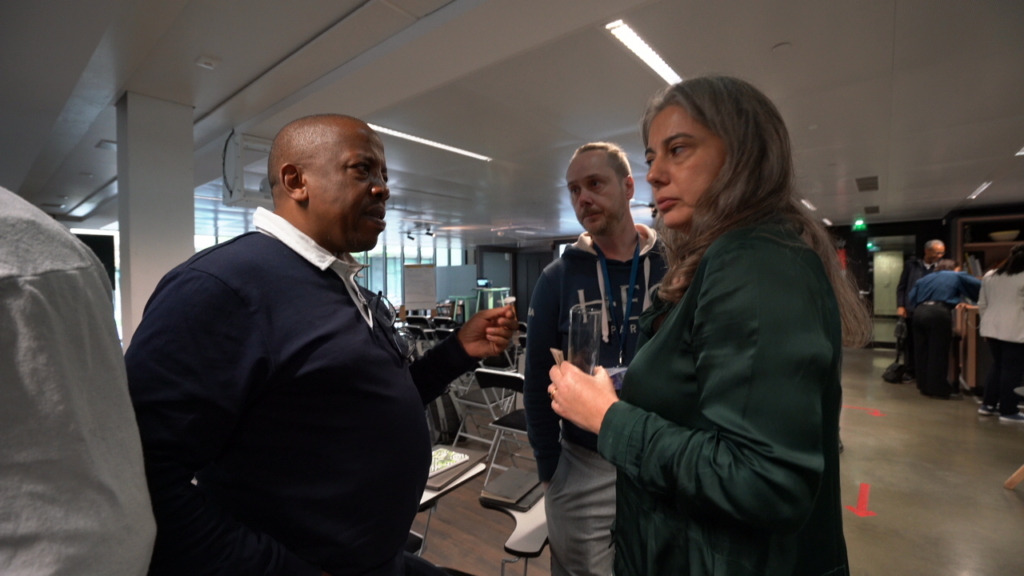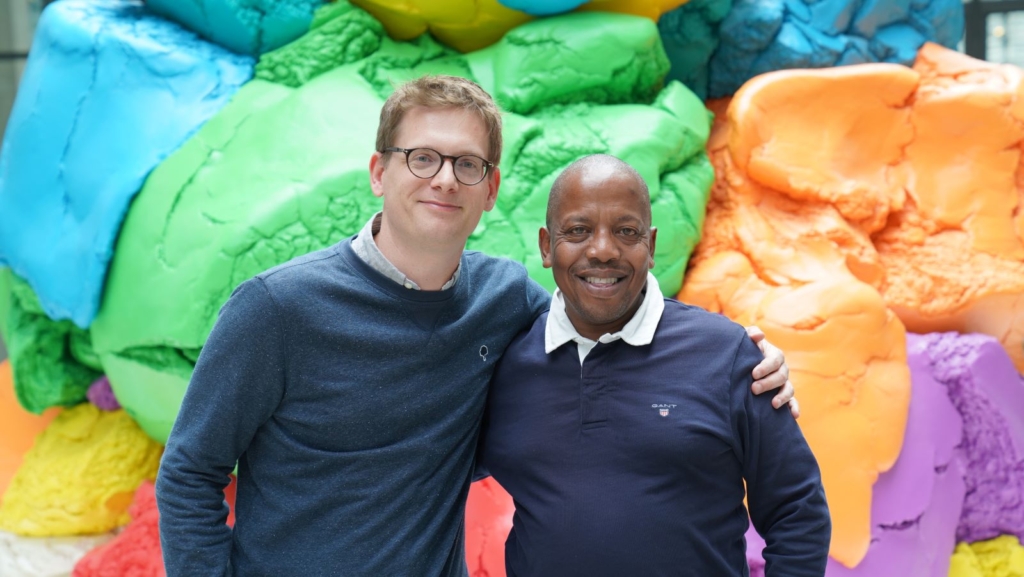South African serial entrepreneur and HEC Paris EMBA student, Malose Kekana, EMBA ’24, has achieved much at the age of 52. The firms he has founded in real estate management, construction, and construction services either directly or indirectly employ over 2,000 people, and he estimates to have brokered deals between €500 million and €1 billion.
True to form, the lifelong company builder and University of Cape Town alum isn’t stopping anytime soon. A voracious thirst for knowledge that has catalyzed his sterling track record in entrepreneurship has spurred him in his pursuit of an Executive MBA at HEC Paris.
He knew the HEC Paris EMBA would be uniquely suited to his needs, affording him the opportunity to study and work simultaneously in an enriching and immediately impactful environment. For example, he was able to apply his learnings in Corporate Social Responsibility to his various businesses right away, to say nothing of the expanded scope of understanding of his leadership style.
But he never imaged how easily— or how quickly— the synergies he’d create with classmates would lead to new entrepreneurial adventures.
Why an EMBA makes sense at 50
The average age of HEC Paris EMBA students is around 40. Still, the program has a strong minority of students both younger and older than the mean. All of them leaders, they come to the HEC Paris EMBA with an array of professional objectives.
In Malose’s case, his unquenchable entrepreneurial resolve means pursing an EMBA was about the injection of pure concentrated knowledge— a “thinking sabbatical,” as he puts it—as opposed to a promotion or a career change.
For Malose and his classmates, the program has also proven the rare opportunity to form close social bonds later in life. Malose’s experience at HEC Paris has been transformative. He has gained countless new perspectives, ideas, and connections, all of which he is eager to put into action.
In fact, after a casual conversation with fellow entrepreneur and classmate Thomas Gasser, EMBA ’24, the two agreed to partner into new horizons with a business venture born at HEC Paris.
Malose sat down with us to explain why choosing HEC Paris made all the sense in the world for him, how it’s already helping him strengthen his existing businesses, and how his newest venture is just the beginning of HEC-born business ideas for him.
Why did you decide to pursue an EMBA in the first place?
Malose Kekana: During Covid-19 lockdown, I reflected a lot on what I had achieved professionally, and the kind of difference I wanted to make in society. Ending homelessness in my community is a cause very dear to my heart, so I set it as my next professional goal.

I felt that to gather my thoughts and reflect on my career would greatly benefit and refresh me – I call it an Academic Sabbatical. In figuring out my next move, I felt I needed to do so in an academically rigorous environment. I believe in business plans— if you don’t plan, you plan to fail— I knew that I needed to choose an academically rigorous environment and it needed to be the best of the best.
Because I work in real estate development, the natural thought to me is “how do I use the space I am in to make sure I am not the only one uplifted, but also my community?”
At my age, I’m not doing an EMBA to get a promotion. I’m using it to learn.
Why did you, as a Johannesburg-based serial entrepreneur, select HEC Paris for your EMBA, and why did you choose the September intake?
MK: I chose HEC because:
- It is an overseas institution which would broaden my horizon beyond South Africa.
- It is ranked among the top EMBA programs globally.
- For most of the year, the time zone for Paris is the same as in Johannesburg, meaning no jet-lag (so I am in the same time zone as my businesses) when I arrive for class. The time zone constraint immediately ruled out US institutions, for example: while attending class at HEC Paris, I can wake up the same time as I do in South Africa, and sleep the same time I do here.
- The flexible and customizable arrangement of the modules enable me to work and study with only 49 days out of office.
- It gives you the opportunity to work, and also to learn. Other programs take you out of the office completely; the way the EMBA is structured, I am able to continue to work and study simultaneously. I have a lot of businesses that I’m running, so I can’t take time off.
- There’s an active HEC Paris alumni group in South Africa, with lots of activities.
The time zone similarities help a lot. I’m able to arrive in Paris after a long flight and function more or less normally because of the time difference. An EMBA is an aggregation of marginal gains. You have to have the discipline of doing a little bit at home every day in order to do well. That kind of discipline of simply knowing the deadlines, doing a little bit every day, has been important.
The synchronous digital and online aspect allows one to prepare for the face-to-face lectures at your own pace. The on-campus lectures occur every 8 to 10 weeks, for a period of about a week each time,which ensures that you are not away from the office for a long stretch and for too many days in total.
I have a lot of support from the family and we have rearranged our vacations to accommodate my studies.
How has your EMBA enabled you to immediately apply knowledge to your businesses?
MK: There is so much I have learned already and that I am already applying in my businesses. From Leadership (applying Situational Intelligence and other tools) to Business Strategy to Corporate Finance and Digital Management, I have been able to pull impactful learnings from my classes and apply them right away.
The most notable example, however, has been in the field of Environmental and Social Governance (ESG):
Before the program, I wasn’t deeply exposed to ESG. None of my businesses are publicly listed, so there has never been any real stakeholder pressure to get into it.
My classmate Luka, who works at Adidas, shared a detailed description of how he participated in a project at Adidas, where he collected plastic and recyclables to make products. That blew my mind.
In my own companies, we’ve launched a CSR/ESG strategy that’s approved by our board, all stemming from what I learned at the EMBA.
Even my board members commented during my business strategy. They noticed how much I’ve grown in this area. They have been impressed with how I’ve embraced it since the EMBA. Before, we used language like “shareholders”— since then, we’ve replaced it with “stakeholders.”
It’s not about profits— it’s about the famous “triple bottom line”: pursue profits, but make sure you take care of the environment and the people around you.
The EMBA is affording me the opportunity to reflect on my experience over the years, and to question or reframe the things I thought I know.
How did the HEC Paris EMBA’s unique entrepreneurial possibilities bring you to teaming up with classmate Thomas Gasser for your next venture?
MK: I found Thomas’s business to be quite interesting. He was featured in a TV interview as an entrepreneur and one of our classmates posted the interview on our class social platform. We started chatting when we are on campus about opportunities to expand into our market. Fortunately, my team also shared the interest.
One thing I really love about the class is that we really celebrate each other’s achievements. There is such an amazing sense of goodwill. Thomas appeared on French television, and someone posted it. I went and looked it up, and I found it incredibly interesting. I asked to sit with him at lunch, and I told him that I’m really keen on bringing it to South Africa because it doesn’t exist there. We started discussing, and I introduced him to my team, and we signed an agreement to bring his product to the South African market.
In business, you don’t do business with companies— you do it with people. The EMBA has afforded an opportunity to create personal relationships with my classmates, so it makes sense for us to go into business together.

When I told people that I’m expanding into Poland, a Polish classmate who works at the European Investment Bank offered to advise, another Swedish colleague linked me up with a lawyer who’s very active in Poland. We all genuinely want to help each other.
It’s such an open spirit of sharing and caring for each other. The camaraderie and the unity, how we lift each other up—It’s honestly one of the best value propositions, with the deep relationships you form that will be there long after you leave campus.
What insights and practical advice about the program experience would you give aspiring EMBA candidates?
MK: An EMBA is an aggregation of marginal gains.
At the EMBA, you can tell that everyone is there for a reason. Everyone is very serious about being there. It’s amazing. In the groupwork, I have never been part of a group where someone isn’t pulling their weight. It creates a certain commonality about purpose which becomes part of who you are.
Like I said earlier, you have to have the discipline of doing a little bit at home every day in order to do well. That kind of discipline of simply knowing the deadlines, doing a little bit every day, has been important.
It’s good to schedule your study time. I added something I call “focus time” to my diary as a result of this. I’ve set aside at least 2-3 hours every day of focus time, and spend even more time on this on the weekend.
“If you love learning, the program experience is similar to the famous ‘runner’s high’”.
Really getting involved in the program and making it an enjoyable experience, will not make the study time required for the EMBA will feel like a burden. You have to do it because you love learning and you’re into expanding your knowledge and as soon as you are in that mindset, it becomes effortless.
My mind is in the zone. It’s put me into a paradigm of learning that I haven’t been part of for a very long time. It opens your eyes and knowledge to places you didn’t think existed. As a human being you feel that experience quite vividly.
If you love learning, the program experience is similar to the famous “runner’s high”.
When you focus and you are into it, and you REALLY get into it— not just doing the assignment, but really to learn— you get to a point where you say to yourself ‘oh my goodness, this is so mind blowing.’
More CEOs of Fortune Global 500 companies have graduated from HEC Paris than any other university in Europe. Nearly 4,000 graduates are currently CEOs, CFOs, or have founded their own companies. The Executive MBA at HEC Paris perennially ranks among the best in the world; click here to learn more.
To get the latest news and information about the HEC Paris Executive MBA delivered straight to your inbox, sign up for our newsletter.
If you’re ready to take the next step in your EMBA journey, introduce yourself to our recruitment team.
Recent Comments